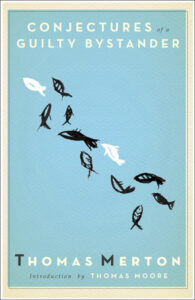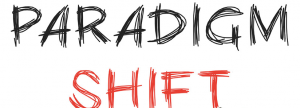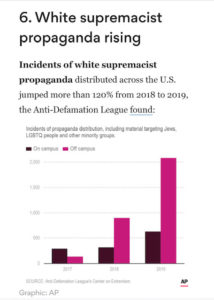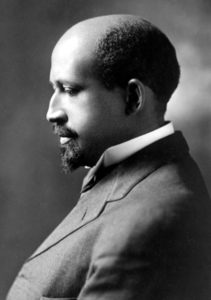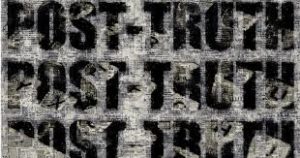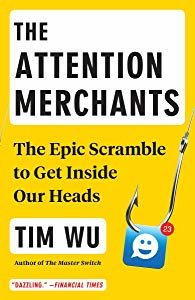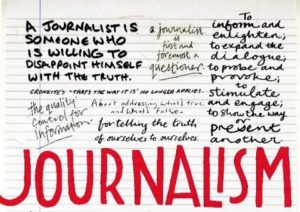propaganda
Thomas Merton.
September 5, 2020‘This restoration of a climate of relative sanity is perhaps more important than specific decisions regarding the morality of this or that strategy, this or that pragmatic policy.’
-Seeds of Destruction
An outspoken proponent of the antiwar and civil rights movements, Thomas Merton was both hailed as a prophet and castigated for his social criticism. He was also unique among religious leaders in his embrace of Eastern mysticism, positing it as complementary to the Western sacred tradition.
‘The real violence exerted by propaganda is this: by means of apparent truth and apparent reason, it induces us to surrender our freedom and self-possession. It predetermines us to certain conclusions, and does so in such a way that we imagine that we are fully free in reaching them by our own judgment and our own thought. Propaganda makes up our mindfor us, but in such a way that it leaves us the sense of pride and satisfaction of men who have made up their own minds. And, in the last analysis, propaganda achieves this effect because we want it to. This is one of the few real pleasures left to modern man: this illusion that he is thinking for himself when, in fact, someone else is doing his thinking for him. And this someone else is not a personal authority, the great mind of a genial thinker, it is the mass mind, the general “they,” the anonymous whole. One is left, therefore, not only with the sense that one has thought things out for himself, but that he has also reached the correct answer without difficulty – the answer which is shown to be correct because it is the answer of everybody. Since it is at once my answer and the answer of everybody, how should I resist it?’
-Conjectures of a Guilty Bystander
Scorched earth.
September 4, 2020He continues his trajectory to burn our institutions. Why do people named not come forward and confirm his destruction? Without compassion, empathy, sympathy, or love, he must have sold his soul long ago.
Voice of America, now Stars & Stripes. His and his father’s disdain for the military, not the Pentagon, but the service members, continues.
The Guardian
Stars and Stripes traces its origins to Bloomfield, Missouri, in November 1861, when troops under the future president Ulysses S Grant took over the printing press of a Confederate sympathiser.
It has traditionally provided news free of government censorship, often critical of military and civilian commanders, and is delivered daily to troops around the world, even on frontlines.
https://www.theguardian.com/us-news/2020/sep/04/pentagon-stars-and-stripes-newspaper-trump
Voice of America
Massachusetts [D] Senator Elizabeth Warren called it corruption. In a tweet, she said: “Steve Bannon’s buddy Michael Pack should understand that Voice of America’s programming is supposed to support freedom and democracy around the world.”
How Trump’s obsessions with media and loyalty coalesced in a battle for Voice of America
The swift purge of former appointees has increased the worry among Democrats and press freedom advocates that the Trump administration is attempting to gain control over an independent but federally funded media organization with among the largest audiences in the world. On its own, the Voice of America delivers television and radio programs to 236.6 million people — and in some countries dominated by state media, it is the only free and unshackled news source.
“If those in charge of our society – politicians, corporate executives, and owners of press and television can dominate our ideas, they will be secure in their power. They will not need soldiers patrolling the streets. We will control ourselves.”
-Howard Zinn
Propaganda presents one view of an issue as if it were an absolute truth.
The zone is flooded.
May 17, 2020The medieval English anchoress Julian of Norwich bequeathed us a radically optimistic theology. She had no problem admitting that human beings have a tendency to go astray. We rupture relationships, dishonor the Divine, make unfortunate choices, and try to hide our faults. And yet, Julian insists, “All will be well and all will be well and every kind of thing shall be well.”
She squarely faces the inevitability that we will miss the mark [what Julian calls “sin”] and that there is wickedness in this world. Even so, she is convinced that the nature of the Divine is loving-kindness, and she wants us to absorb this into every fiber of our being. -Fr. Richard Rohr
‘I urge you to avoid those who cause dissension and offenses contrary to what you have learned. Avoid them.’
[Romans 16:17]
Thomas Merton:
I am certainly no judge of television, since I have never watch it. All I know is that there is a sufficiently general agreement, among men who judgment I respect, that commercial television is degraded, meretricious, and absurd. Certainly, it would seem that TV could become a kind of unnatural surrogate for contemplation: a completely inter subjection to vulgar images, a descent to a sub natural passivity rather than an ascent to a supremely active passivity in understanding and love. It would seem that television should be used with extreme care and discrimination by anyone who might hope to take interior life seriously.
-New Seeds of Contemplation, 1949
His thoughts on the Internet, we can only imagine, would be the same. -dayle
VOX/By
This is a new form of propaganda tailored to the digital age and it works not by creating a consensus around any particular narrative but by muddying the waters so that consensus isn’t possible. And it’s all the more difficult because even the most scrupulous, well-intentioned coverage can easily fall into the trap of flooding the zone.
Zone-flooders.
The press, admittedly, has a difficult job to do, especially in this information landscape. But that’s the thing: The landscape has changed. The digital media ecosystem overwhelms people with information. Some of that information is true, some of it is false, and much of it is deliberately diversionary. Trying to cover every crazy story, every batshit claim, is a fool’s errand. The end result of so much noise is what I’ve called “manufactured nihilism,” a situation in which people are so skeptical about the possibility of truth that they give up the search.
The role of “gatekeeping” institutions has also changed significantly. Before the internet and social media, most people got their news from a handful of newspapers and TV networks. These institutions functioned like referees, calling out lies, fact-checking claims, and so on. And they had the ability to control the flow of information and set the terms of the conversation.
Today, gatekeepers still matter in terms of setting a baseline for political knowledge, but there’s much more competition for clicks and audiences, and that alters the incentives for what’s declared newsworthy in the first place. At the same time, traditional media outlets remain committed to a set of norms that are ill adapted to the modern environment.
So now we find ourselves engaged in an endless game of whack-a-mole, debunking and explaining one false claim after another. And false claims, if they’re repeated enough, become more plausible the more often they’re shared, something psychologists have called the “illusory truth” effect.
The prevailing norms of journalism and the political economy of media are driving these dynamics.
Basarab Nicolescu
May 11, 2020?
A “STOP!” – planetary and individual*
Basarab Nicolescu
‘Everything happens as if a “STOP! had been given on a planetary level. Of course, it was not this summary and unconscious entity of the infinitely small, the coronavirus, which gave this order. This order seems to emanate from the cosmic movement itself disturbed by the mad dream of the human being to dominate and manipulate Nature.
Everything stopped suddenly for half the countries of the world. This immobility did not fail to reveal to us all the flaws of globalization centered on profit and money. But which of the world’s politicians and leaders will be the ones to see? We are plunged into the blindness of the darkness of our habits of thought and the ideologies of progress, totally out of step with reality. How do you open your eyes to what’s going on? In my opinion, the only solution is the spiritual evolution of the whole of humanity. It alone could take into account all the levels of Reality and the Hidden Third.
It also happens as if a “STOP! had been given on an individual basis. We are suddenly in front of ourselves, before the mystery of our being, thus giving the exceptional opportunity of a spiritual evolution for each of us. This spiritual evolution of each human being conditions that of humanity.
We thus discover that the spiritual underdevelopment of the human being and humanity is the real cause of the crisis that we are going through and that we are going to go through.
But what spirituality is it? It is a radically new, transreligious and transcultural spirituality. Transdisciplinarity offers the tools for the establishment of such a spirituality, based on the community of destiny of all beings on earth. Two thousand years ago, the greatest visionary of all time, Jesus, asked “Love your enemies” (Matthew 5:44).
Without love nothing is possible to act on our destiny.
The world at the time refused such a message and preferred to kill Jesus. Two thousand years later, we are in exactly the same situation, on the brink of self-destruction of the species, a danger increased since by technological development and the immense means of destruction. The anthropocene without spiritual dimension will lead us to the brink of the abyss.
We must make, with great humility, a new pact of partnership with Nature and with all beings on earth – humans, animals, birds, trees, plants. We must stop defiling Nature with our excessive pride and our desire for omnipotence. All war should be declared a crime against humanity and all means of destruction should be destroyed.
All this can be understood as a utopia which goes against the principle of reality.
One possible answer is that of Michel Houellebecq: “I don’t believe in statements like” nothing will ever be the same again “. We will not wake up, after confinement, to a new world; it will be the same, only a little worse ”. If we contemplate the behavior of political leaders and public opinion in this period of crisis, it is to be feared that Michel Houellebecq is right. Politicians are returning to their usual language of mutual hostility and this will cause considerable social tension.
The media bombardment plunges us into an anxiety-provoking climate where, paradoxically, even death takes an abstract dimension: a dead person is just a number in a statistic. Nothing of the suffering of the one who dies, alone, suffocated by the coronavirus, reaches our place. This is glaring evidence of our spiritual underdevelopment.
The hidden hypothesis of Michel Houellebecq’s reasoning is the impossibility that human beings can evolve.
But another solution exists. Man must be born again if he wants to live.
Our task is immense. Let’s try not to be hypnotized by the multitude of doomsayers and apocalyptic thinkers of all kinds who predict the fall of the West and the demise of our world.
The word “Apocalypse” does not mean “end” or “destruction”, but “Revelation”. We are fortunate to have before our eyes, here and now, an extraordinary Revelation which can allow us to access Life and Meaning. I suggest reading, in these difficult times, the extraordinary book of Paule Amblard Saint John – The Apocalypse, illustrated by the tapestry of Angers [1]. Paule Amblard offers us a coherent interpretation of The Apocalypse of John by the necessity of the spiritual evolution of man. The appalling plagues which cross the text of The Apocalypse are, in truth, the torments of the human soul separated from what founds it. The Apocalypse of John is a message of longing and hope.’
[1] Paule Amblard, Saint Jean – L’Apocalypse, illustrée par la tapisserie d’Angers, Diane de Selliers Éditeur, Paris, 2017.
* Text translated from French by Gerardo del Cerro Santamaria.
Seth Godin:
Marketers used to have little choice. The only marketing was local. The local neighborhood, the local community.
Mass marketing changed that. Now, the goal was to flip the culture, all at once. Hit records, hit TV shows, products on the end cap at Target and national TV ads to support it all.
With few exceptions, that’s being replaced by a return to clusters.
The cluster might be geographic (they eat different potato chips in Tucscon than they do in Milwaukee) but they’re much more likely to be psychographic instead. What a group of people believe, who they connect with, what they hope for…
The minimal viable audience concept requires that you find your cluster and overwhelm them with delight. Choose the right cluster, show up with the right permission and sufficient magic and generosity and the idea will spread.
We’re all connected, but the future is local.
Footprints might be a fine compass, but they’re not much of a map. That’s on us.
More from Seth:
Mathematicians don’t need to check in with the head of math to find out what the talking points about fractions are this week.
That’s because fractions are fractions. Anyone can choose to do the math, and everyone will find the same truth.
Most of the progress in our culture of the last 200 years has come from using truth as a force for forward motion. Centralized proclamations are not nearly as resilient or effective as the work of countless individuals, aligned in their intention, engaging with the world.
We amplified this organizing principle when we began reporting on progress. If you’re able to encounter not just local truth but the reality as experienced by many others, collated honestly, then progress moves forward exponentially faster.
Show your work.
One of the dangers of our wide-open media culture of the last ten years has been that the signals aren’t getting through the noise.
Loud voices are drowning out useful ones. It’s difficult to determine, sometimes, who is accurately collating and correlating experience and reality and who is simply making stuff up as a way to distract us, to cause confusion and to gain influence.
I’m betting that in the long run, reality wins out. That the practical resilience that comes from experimentation produces more effective forward motion.
In the words attributed to Galileo, “Eppur si muove.”
It pays to curate the incoming, to ignore the noise and to engage with voices that are willing to show their work.
~
Thomas Merton:
The question arises: is modern man…confused and exhausted by a multitude of words, opinions, doctrines, and slogans…psychologically capable of the clarity and confidence necessary for valid prayer? Is he not so frustrated and deafened by conflicting propagandas that he has lost his capacity for deep and simple trust?
-Life and Holiness
Where men live huddled together without true communication, there seems to be greater sharing and a more genuine communion. But this is not communion, only immersion in the general meaninglessness of countless slogans and cliches related over and over again so that in the end one listens without hearing and responds without thinking. The content din of empty words and machine noises, the endless booming of loudspeakers end by making true communication and true communion almost impossible.
Each individual in the mass in insulated by thick layers of insensibility. He doesn’t hear, he doesn’t think. He does not act, he is pushed. He does not talk, he produces conventional sounds when stimulated by the appropriate noises. he does not think, he secretes cliches.
-New Seeds of Contemplation
Culture and Clichés correspondent Lynn Berger
We’re constantly told to try something new. ‘Innovate, don’t stagnate.’ But doing things two, three or 30 times creates space for reflection – and innovation. And it can even bring unexpected joy.
‘Politicians know that there are votes to be won with an appeal to what is old and familiar. And they know that this message is most effective when it is repeated endlessly: repetition is the foundation beneath propaganda.
So here’s the paradox: in order to appreciate repetition for what it is, we actually need a new sort of attention.
It’s probably impossible to achieve the level of attentiveness we bring to first times the tenth or hundredth time we do something. But it’s entirely feasible to look more attentively at repetition, not to see it as a stumbling block but as a goal in itself. Not as a copy but as a variation. I suspect that the routines and rituals that make up daily life, the “grind” we’ve learned to fear, would feel less like a slap in the face to the zeitgeist, and more like something worthwhile all on its own.
Repetition is the norm: we’re constantly repeating things, whether we want to or not. But there’s a difference between inattentively doing things again and doing things again by choice. Conscious, attentive, deliberate. With the full awareness that this matters just as much, and with the willingness to see, hear and feel different things when you feel, hear and see them again.’
A certain level of fatigue sets in. The media landscape has fragmented so much that consumers can filter their information diet to those outlets that reflect their worldview.
Marianne Williamson
We need an entirely new politics: one that shifts us from an economic to a humanitarian bottom line, from a war economy to a peace economy, from a dirty economy to a clean economy, and from who we’ve been to who we’re ready to be. #repairamerica
Dalai Lama
Change starts with us as individuals. If one individual becomes more compassionate it will influence others and so we will change the world.
#MustRead ~ Information Ecosystem
February 12, 2020Truths kindle light for truths.
-Julius Caesar
“What you have is a presidential campaign that is pushing lies and distortions and conspiracy theories into the bloodstream at an unprecedented rate,” says Atlantic writer McKay Coppins.
“Eventually, the fear of covert propaganda inflicts as much damage as the propaganda itself.”
The Atlantic
The Billion-Dollar Disinformation Campaign to Reelect the President
How new technologies and techniques pioneered by dictators will shape the 2020 election
“One day last fall, I sat down to create a new Facebook account. I picked a forgettable name, snapped a profile pic with my face obscured, and clicked “Like” on the official pages of Donald Trump and his reelection campaign. Facebook’s algorithm prodded me to follow Ann Coulter, Fox Business, and a variety of fan pages with names like “In Trump We Trust.” I complied. I also gave my cellphone number to the Trump campaign, and joined a handful of private Facebook groups for MAGA diehards, one of which required an application that seemed designed to screen out interlopers.
It’s been reported that the RNC and the Trump campaign have compiled an average of 3,000 data points on every voter in America. And so that means everything from what you like to watch on TV, what kind of stores you shop at, whether you’ve been to a gun show or own a gun. They’ve compiled all this data, and they can use it to carefully tailor messages just for you. And I should say that this is not unique to the Trump campaign. This isn’t something Brad Parscale invented. Barack Obama’s campaign famously did it in 2012. The Clinton campaign did it as well in 2016. But the Trump campaign’s effort was different, both because it was much more extensive and also, frankly, a lot more brazen.
The Trump campaign is planning to spend more than $1 billion, and it will be aided by a vast coalition of partisan media, outside political groups, and enterprising freelance operatives. These pro-Trump forces are poised to wage what could be the most extensive disinformation campaign in U.S. history. Whether or not it succeeds in reelecting the president, the wreckage it leaves behind could be irreparable.”
The Death Star
The campaign is run from the 14th floor of a gleaming, modern office tower in Rosslyn, Virginia, just outside Washington, D.C. Glass-walled conference rooms look out on the Potomac River. Rows of sleek monitors line the main office space. Unlike the bootstrap operation that first got Trump elected—with its motley band of B-teamers toiling in an unfinished space in Trump Tower—his 2020 enterprise is heavily funded, technologically sophisticated, and staffed with dozens of experienced operatives. One Republican strategist referred to it, admiringly, as “the Death Star.”
Next hit? Local News
Parscale has indicated that he plans to open up a new front in this war: local news. Last year, he said the campaign intends to train “swarms of surrogates” to undermine negative coverage from local TV stations and newspapers. Polls have long found that Americans across the political spectrum trust local news more than national media. If the campaign has its way, that trust will be eroded by November. “We can actually build up and fight with the local newspapers,” Parscale told donors, according to a recording provided by The Palm Beach Post. “So we’re not just fighting on Fox News, CNN, and MSNBC with the same 700,000 people watching every day.”
Running parallel to this effort, some conservatives have been experimenting with a scheme to exploit the credibility of local journalism. Over the past few years, hundreds of websites with innocuous-sounding names like the Arizona Monitor and The Kalamazoo Times have begun popping up. At first glance, they look like regular publications, complete with community notices and coverage of schools. But look closer and you’ll find that there are often no mastheads, few if any bylines, and no addresses for local offices. Many of them are organs of Republican lobbying groups; others belong to a mysterious company called Locality Labs, which is run by a conservative activist in Illinois. Readers are given no indication that these sites have political agendas—which is precisely what makes them valuable.
Censorship Through Noise
The political theorist Hannah Arendt once wrote that the most successful totalitarian leaders of the 20th century instilled in their followers “a mixture of gullibility and cynicism.” When they were lied to, they chose to believe it. When a lie was debunked, they claimed they’d known all along—and would then “admire the leaders for their superior tactical cleverness.” Over time, Arendt wrote, the onslaught of propaganda conditioned people to “believe everything and nothing, think that everything was possible and that nothing was true.”
[full read]
https://www.theatlantic.com/magazine/archive/2020/03/the-2020-disinformation-war/605530/
President Barack Obama: Even if the methods are new, sowing the seeds of doubt, division, and discord to turn Americans against each other is an old trick. The antidote is citizenship: to get engaged, organized, mobilized, and to vote – on every level, in every election. 02.11.20 [twitter]
Fresh Air with Terry Gross
“The 2020 Disinformation War,” is in the current issue of The Atlantic, where McKay Coppins is a staff writer. He writes about how the Trump campaign and a vast coalition of partisan media, outside political groups and freelance operatives are poised to wage what could be the most extensive disinformation campaign in U.S. history. As part of his research, Coppins tried to live in the same media and social media world as Trump supporters so he could monitor the information or disinformation they were receiving.”
Coppins:
“A lot of these illiberal leaders have discovered that in the Internet age, in the social media age, in what scholars call the information abundance age, it’s a lot easier to harness the power of social media for their own means. So rather than shutting down dissenting voices, they’ve learned to use the democratizing power of social media to jam the signals or sow confusion. They don’t have to, you know, silence the dissident who’s shouting in the streets; they can actually just drown him out. And I think that over time, you’ve seen this in other countries – certainly in the Baltic states, in Eastern Europe, Russia.
If journalism and facts are treated as equal in credibility to partisan propaganda or lies from political leaders, if it’s all one level playing field, then it becomes almost impossible for political leaders to be held accountable for their actions because you have a population that’s either disengaged or distracted or confused and unable to kind of respond to the various corruptions and scandals and things that they’re getting away with.
Matthew Boyle, an editor at Breitbart who is often involved in this effort, gave a speech at the Heritage Foundation in 2017 where he said, journalistic integrity is dead. There is no such thing anymore. So everything now is about weaponization of information. And that’s really at the root of this whole enterprise. They’re not trying to make journalists be better or get them to do their jobs better. They’re trying to discredit them and weaponize information and make it so that journalism and facts are seen as on par with political talking points and propaganda.”
AP
AXIOS
History’s arc…bending.
June 1, 2019“Nations reel and stagger on their way; they make hideous mistakes; they commit frightful wrongs; they do great and beautiful things. And shall we not best guide humanity by telling the truth about all this, so far as the truth is ascertainable?” -W.E.B. DuBoise, 1935
“The Propaganda of History” / Black Reconstruction in America, 1860-1880
William Edward Burghardt Du Bois was an American sociologist, historian, civil rights activist, Pan-Africanist, author, writer and editor.
Outside the matrix.
January 20, 2019
“I keep coming back to a tweet from the Russian dissident and chess grandmaster Garry Kasparov, who wrote: “The point of modern propaganda isn’t only to misinform or push an agenda. It is to exhaust your critical thinking, to annihilate truth.” Mr. Kasparov understands that the real threat of the flood of “alternative facts” is that many voters will simply shrug, ask, “What is truth?” and, like Pontius Pilate, not wait for an answer.”
The Aspen Institute re-publishes a piece from American Magazine in 2017 from an Aspen Ideas Festival that same year with Charlie Sykes, MSNBC contributor and former conservative talk show host, currently editor-in-chief of the website The Bulwark.
“We might assume that people naturally want to seek out information that is true, but this turns out to be a basic misunderstanding of the human psyche and our new tribal politics. The social psychologist Jonathan Haidt describes the power of tribalism in shaping our ideas about truth. “Once people join a political team,” he writes in The Righteous Mind, “they get ensnared in its moral matrix. They see confirmation of their grand narrative everywhere, and it’s difficult — perhaps impossible — to convince them that they are wrong if you argue with them from outside the matrix.”
Mr. Haidt also cites the work of his fellow social psychologist Tom Gilovich, who studies the cognitive mechanisms of strange beliefs. If we want to believe something, Mr. Gilovich says, we ask, “Can I believe it?” and we need only a single piece of evidence, no matter its provenance, so “we can stop thinking” because we “now have permission to believe” what we want. The flip side is that when we are confronted with uncomfortable or unwanted information that we do not want to believe, we ask, “Must I believe?” and look for a reason to reject the argument or fact. Again, only a single piece of data is necessary “to unlock the handcuffs of must.”
The only antidote is an educated, critically minded electorate who can see through the hoaxes.”
Yes, absolutely. However, a deeper more complex follow-up question: is this a reasonable expectation, or possibility, in context of confirmation biases and deeper polarizations?
full article: https://www.aspeninstitute.org/blog-posts/truth-matter-no-longer-theoretical-question/
“And the fourth cycle (of computers), which is now arriving, shifts direction from the previous two (which were about connection more than processors) and brings prediction to the table. Call it AI if you want to, but to be specific, it’s a combination of analyzing information and then predicting what we would do if we knew what the computer knew.
The prediction of the fourth cycle isn’t simply done in a centralized location, because the previous cycle put the computer everywhere. So now, we’re connecting all the computers the way we previously connected all the people. Now, we’re giving those computers the ability to make predictions based on what thousands of people before us have done.”
-Seth Godin
Entrepreneur and blogger who thinks about the marketing of ideas in the digital age, teacher and former dot com guy.
“We still have a lot to learn before 2020.”
January 16, 2019Stanford World Class
Former Facebook Chief Security Officer Alex Stamos (now at Stanford) discusses Russia’s election interference and the use of pure propaganda techniques. Much of the spotlight on Big Tech is warranted. However, Stamos also argues that our government, the media, and we as citizens all have a role to play in the security of our elections.” #MSM
“To block Russian propaganda during 2016 really Facebook would have had to block the New York Times, The Wall Street Journal, and the Washington Post.”
Tech companies have failed in a lot of ways, but there was a lot of misplaced raged by main stream media against tech companies because they have not dealt with their own failings in 2016. […] They’re not writing stories about their editorial decisions, but those decisions were critical.”
Bernays.
January 11, 2019Propaganda
only through the active energy of the intelligent few can the public at large become aware of and act upon new ideas.
propaganda bears the same relation to education as to business or political. It may be abused. It may be used to over-advertise an institution and to create in the public mind artificial values. There can be no absolute guarantee against its misuse.
a presidential candidate may be ‘drafted in response to ‘overwhelming popular demand,’ but it is well known that his name may be decided upon by half a dozen men sitting around a table in a hotel room.
governments, whether they are monarchical, constitutional, democratic or communist, depend upon acquiescent public opinion for the success of their effort and, in fact, government is government only by virtue of public acquiescence.
a civilization has become more complex, and as the need for invisible government has been increasingly demonstrated, the technical means have been invented and developed by which opinion may be regimented.
nowadays the successors of the rulers, those whose position or ability gives them power, can no longer do what they want without the approval of the masses, they find in propaganda a tool which is increasingly powerful in gaining that approval.
democracy is administered by the intelligent minority who know how to regiment and guide the masses.
an entire part, a platform, an international policy is sold to the public, or is not sold, on the basis of the intangible element of personality.
“Edward Bernay’s honest and practical manual provides much insight into some of the most powerful and influential institutions of contemporary industrial-state capitalist democracies.” -Noam Chomsky
Attention is Resource
October 3, 2018Life is what we pay attention to. [William James] Attention is “key to life and a meaningful life.”
Tim Wu, a Columbia University Law Professor, delves into the history of the advertising industry in his book, The Attention Merchants. Hidden Brain: “In his book, Wu reveals the techniques media companies have developed to hijack our attention. “This sort of of surrender of control over our lives speaks deeply to the challenge of freedom and what i means to be autonomous.”
This Is Your Brain On Ads: How Media Companies Hijack Your Attention
Posted by Daniel Natal:
Renaissance For Truth & Accuracy
August 11, 2018Boston Globe Calls For Nationwide Media Response To Trump’s Attacks On The Press
Woodstein U: Notes on the Mass Production and Questionable Education of Journalists
“There is an inextricable link between repressing the freedom of the press and repressing the freedom for civil society to campaign for their rights. Both are an attempt to repress “inconvenient truths,” silencing protesting voices, and dimming the spotlight on illegal activity perpetrated by individuals, companies, and governments in power. And both deserve the world’s attention.”
The late Ben Bagdikian, who wrote a cover story for The Atlantic in March 1977 on the so-called Woodstein phenomenon, summed it up like this: Bob Woodward and Carl Bernstein “were young, inexperienced, and not particularly promising in the eyes of their superiors. Working in a city and on a paper where the country’s most celebrated journalists were in top command, the two beginners beat them all and became national heroes … If they could do it, why couldn’t every high school student?”

Washington Post writers Carl Bernstein, left, and Robert Woodward, who pressed the Watergate investigation, are photographed in Washington, D.C., May 7, 1973. It was announced that The Post won the Pulitzer Prize for public service for its stories about the Watergate scandal. (AP Photo)
But one experienced news director at a major television station said: “I prefer someone who majored in sociology or architecture or art history or psychology rather than somebody who spent a year or two learning how to put a film story together. One of our best reporters was a Rhodes scholar specializing in Florentine history. Given the nature of politics in this city. I don’t think that expertise in Machiavellian politics is such a bad idea.”
The people who hire journalists say they are divided on the value of journalism schools. But what about practitioners of journalism who, with the benefit of years of experience, can look back and judge for themselves? Did journalism graduates distinguish themselves over non-journalism graduates?
I wrote to fifty-three journalists who have won Pulitzer Prizes over the last ten years. Of those who responded. 75 percent did not major in journalism, most having degrees in English. English literature, history, or philosophy. Three did not attend college.
These Pulitzer Prize-winners were largely hostile to the idea of journalism schools and most of those approving a journalism degree specified that they favored a different undergraduate degree with journalism solely in a year of graduate work.
“THE POLITICS OF DISTRACTION” TROUBLE MEDIA STUDIES PROF. KEVIN HOWLEY
August 10, 2018
[A newspaper column from DePauw University Professor Kevin Howley takes media to task for being distracted from real issues by rhetoric.]
“Ever since [DT] announced his candidacy, the news media has followed his Twitter account with all the anticipation and credulity of a child on Christmas morning,” according to Kevin Howley, professor of communication at DePauw University. In a newspaper column, Howley continues, “Eager to publish — and profit handsomely from — the latest presidential tweet storm, an obliging press corps rewards Trump’s narcissism as it normalizes his authoritarianism.”
After the president tweeted last week that Attorney General Jeff Sessions should end the ongoing ngoing Special Counsel investigation into Russian interference in the 2016 presidential election, “Reporters and pundits spent the better part of the news cycle parsing the president’s words and debating whether this latest episode constitutes obstruction of justice,” Dr. Howley observes. “What’s most troubling about all of this is how willingly reporters and editors participate in Trump’s politics of distraction.”
In Howley’s view, the media’s myopic obsession with the president amount to “endless distractions that prevent us from addressing vital problems, like climate change and the health care crisis, that require immediate attention.”
The professor’s op-ed concludes, “The Romans knew a thing or two about the politics of distraction. They called it ‘bread and circuses.’ We call it ‘fake news.’ Despite, or perhaps because of the spectacle, the Roman Empire collapsed under its own imperious weight. Maybe there’s a lesson in that for the American Empire.”
You’ll find the complete text at the website of Indiana’s Kokomo Tribune.
Dick Cavett in the Digital Age
Stopping to smell the flowers with the last great intellectual talk-show host.
“Well, that’s an awkward subject matter for me, because I know all of them,” Mr. Cavett, 81, said on a recent sunny Thursday afternoon at his sprawling country house in Connecticut. “I’m not addicted to talk shows. God knows, I’ve spent enough time on them.”
As in Mr. Cavett’s 1960s and ’70s heyday, the country is in a period of turbulence, with racial tensions flaring, protests in the streets, and a fundamental ideological fissure. The hosts who have emphasized substance, who have “gone political,” have been praised and nominated for Emmys.
But “the next Cavett”? Is such a thing possible?
If only.
For three decades, Mr. Cavett was the thinking person’s Johnny Carson, embodiment of an East Coast sophisticate. He wore smart turtlenecks and double-breasted blazers, had more cultural references than a Google server and laced martini-dry witticisms into lengthy, probing talks with 20th-century luminaries including Bette Davis, James Baldwin, Mick Jagger and Jean-Luc Godard.
A Renaissance salon in a rabbit-ears era, “The Dick Cavett Show” was woke some 50 years before the term came into vogue. Viewers tuned in to see Muhammad Ali spout off about the Vietnam War or to see Yoko Ono in a 90-minute discussion with John Lennon.
While Mr. Cavett said he loathed Nixon’s politics, he called him “a brilliant, brilliant man” and was cordial to him in person. Years after Watergate, he remembers seeing the former president and his younger daughter, Julie, seated at an outdoor restaurant in Montauk, so he grabbed a menu and, posing as a waiter, began to list the specials: Yorba Linda cream pie, Whittier College soufflé.
Not his best material, Ms. Nixon told him.
The current president is perhaps the only celebrity over the age of 70 that Mr. Cavett has never met, other than being beaten by him to shrimp in a benefit buffet line years ago.
“I think all people who get to president of the United States must have something wonderful about them,” Mr. Cavett said in a mock-diplomatic tone.
“With that,” he added, “Cavett held a gun to his head and shot himself.”
AP Headline:
“Republicans promote fear, not tax cuts, in key elections”
[From space to borders, ‘fear is a contagion in a democracy.’]
“FEAR: Trump in the White House,” by Pulitzer Prize-winning journalist and bestselling author Bob Woodward, will be published by Simon & Schuster on Sept. 11th.
- “Drawing from hundreds of hours of interviews with firsthand sources, contemporaneous meeting notes, files, documents and personal diaries, FEAR brings to light the explosive debates that drive decision-making in the Oval Office, the Situation Room, Air Force One and the White House residence.”
- Jonathan Karp, president and publisher of Simon & Schuster: “‘FEAR is the most acute and penetrating portrait of a sitting president ever published during the first years of an administration.”
- “FEAR is Woodward’s 19th book with Simon & Schuster, beginning with ‘All the President’s Men’ in 1974. Each of the previous 18 books he authored or co-authored has been a national nonfiction bestseller. Twelve of those have been #1 national bestsellers.”
The WashPost’s Manuel Roig-Franzia writes that the “expected tenor of the book is underscored by its unsettling cover, an extreme close-up of a squinty-eyed Trump depicted through a gauzy red filter.”“The hush-hush project derives its title from an offhand remark that then-candidate Trump made in an interview with Woodward and Post political reporter Robert Costa in April 2016.
“DT said: “Real power is, I don’t even want to use the word: ‘Fear.’
“Woodward … has privately described the remark as ‘an almost Shakespearean aside.'”
Hope Reese, JSTOR Daily
The American philosopher Martha Nussbaum’s new book, The Monarchy of Fear, examines the politics of primal fear in the 2016 election.
In November 2016, the American philosopher Martha Nussbaum was in Tokyo preparing to give a speech when she learned of the results of the U.S. presidential election. Worrying about the implications of Trump’s victory, Nussbaum, who has long studied the philosophy of emotions, realized that she “was part of the problem.”
The examination of her own reaction resulted in Nussbaum’s latest work, The Monarchy of Fear––part manifesto, part Socratic-style dialogue about the large role that fear plays in our current political era and why it represents a serious danger to democracy. Nussbaum has explored a range of emotions in her work, and this book, she tells me, makes the case that “anger, disgust, and envy…are poisoned and made more disruptive by fear.” Fear, Nussbaum argues, is both a primal emotion, an impulse felt by infants, and an emotion shaped by social context as we become older. Fear is asocial, narcissistic––and often misguided. When we fear others, Nussbaum says, we are often not taking facts and information into account––and we are often perceiving dangers that don’t exist.
“The nature of fear is that it’s very volatile and it’s very easily hijacked by rhetoric.”
The list of what ails the U.S. politically today is long and complicated, with problems as different as vast economic inequalityand gerrymandered congressional districts. But if we’re honest with ourselves, many of the country’s most serious problems exist within us, in the hearts and minds of its people. We shelter ourselves from perspectives and facts that disagree with our own. Our politics seem more rooted in contempt and schadenfreude than empathy and reason. Politicians exploit racial, ethnic, and class divisions, leaving many Americans feeling even more targeted and disenfranchised. And a foreign adversary disseminates false information through social media because it believes that Americans cannot (or won’t really care to) distinguish reality from manipulative fiction.
Those are shortcomings in our skills and dispositions. Do public schools have a role to play in developing them? We believe they do. Schools, more than any other public institution, are charged with preparing students for the responsibilities of civic life. Parents play a critical role, too, but schools are better positioned to ensure that all children have a core set of experiences. This includes developing skills that might not be on parents’ radar, like how to evaluate news disseminated over social media. Believing that schools ought to sharpen students’ civic skills and dispositions isn’t, as Finn suggests, a product of political correctness run amok, nor is it an inherently left-of-center idea. Americans have long seen this kind of thing as a core function of schools, and even Milton Friedman’s argument for vouchers is built on a notion that schools ought to instill a common set of values.
Perhaps Finn’s critique is that teaching facts is the way to develop civic skills and dispositions, or that students develop these skills and dispositions without schools teaching them explicitly. Perhaps rather than directly teaching news and media literacy or providing students with opportunities to engage in and experience the political process, schools should stick to teaching facts and modeling nice behaviors. We see that as a missed opportunity.
Hannah Arendt Explains How Propaganda Uses Lies to Erode All Truth & Morality: Insights from The Origins of Totalitarianism
In an ever-changing, incomprehensible world the masses had reached the point where they would, at the same time, believe everything and nothing, think that everything was possible and nothing was true… The totalitarian mass leaders based their propaganda on the correct psychological assumption that, under such conditions, one could make people believe the most fantastic statements one day, and trust that if the next day they were given irrefutable proof of their falsehood, they would take refuge in cynicism; instead of deserting the leaders who had lied to them, they would protest that they had known all along that the statement was a lie and would admire the leaders for their superior tactical cleverness.
The result of a consistent and total substitution of lies for factual truth is not that the lie will now be accepted as truth and truth be defamed as a lie, but that the sense by which we take our bearings in the real world—and the category of truth versus falsehood is among the mental means to this end—is being destroyed.
“We too,” writes Jeffrey Isaacs at The Washington Post, “live in dark times”—an allusion to another of Arendt’s sobering analyses—“even if they are different and perhaps less dark.” Arendt wrote Origins of Totalitarianism from research and observations gathered during the 1940s, a very specific historical period. Nonetheless the book, Isaacs remarks, “raises a set of fundamental questions about how tyranny can arise and the dangerous forms of inhumanity to which it can lead.” Arendt’s analysis of propaganda and the function of lies seems particularly relevant at this moment. The kinds of blatant lies she wrote of might become so commonplace as to become banal. We might begin to think they are an irrelevant sideshow. This, she suggests, would be a mistake.
A new paradigm for journalism.
September 11, 2017‘When we fiercely hate one another, we make ourselves vulnerable to propaganda and demagogues. Hate blinds people to the truth.’
Jimmy Carter’s advice for President Trump: “Keep the peace, tell the truth”


